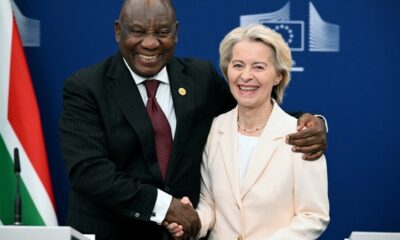Business
South Africa Set to Leave the FATF Grey List: What It Really Means for the Economy

The Calm Before the Decision
South Africa is standing at a financial crossroads, waiting to hear whether it will finally be removed from the Financial Action Task Force (FATF) grey list. The verdict arrives on 24 October, and unlike the anxiety that surrounded its initial listing in early 2023, markets are already calm, because this time, the outcome seems almost certain.
Analysts and fund managers say the market has already priced in South Africa’s likely exit. That means no dramatic swings in the rand or JSE if the announcement goes the country’s way. In short, the financial world has been expecting this moment.
Why We Were Greylisted
Back in February 2023, the FATF flagged South Africa for weaknesses in preventing money laundering and terrorist financing. Being greylisted didn’t mean sanctions, but it did send a strong warning to international investors, placing South Africa under additional scrutiny and increasing compliance costs for banks and businesses.
Since then, government bodies, including the National Treasury, South African Reserve Bank, and Financial Intelligence Centre, have worked through 22 action items to fix the gaps. By June 2025, FATF confirmed that all actions had been addressed and scheduled an on-site review to verify progress.
Now, after nearly two years of reforms, the decision is due.
Why Markets Are Staying Cool
According to Bastian Teichgreeber, Chief Investment Officer at Prescient Investment Management, there’s more than a 90% chance South Africa will be delisted. He believes investors have already priced this into the market, meaning the announcement will be more of a confirmation than a surprise.
“If South Africa somehow stays on the list, that’s when we’ll see a real market shock,” he noted. “That would undermine confidence and hurt domestic assets.”
So far, though, the data tells a different story. Investors have already been cautiously optimistic, with steady inflows into equities and bonds since the 2024 national elections. However, these gains have largely come from local, not foreign, investors.
What Comes Next
Even if South Africa is officially removed from the grey list, experts warn it’s only one part of a much larger puzzle. The country still faces sluggish foreign direct investment (FDI), and the rand remains influenced by global forces such as the dollar’s strength and international interest rates rather than local policy wins.
Teichgreeber said the delisting would give a boost to investor confidence, but it won’t instantly transform the economy. “The rand might tick up slightly, but there are many other moving parts,” he explained.
He also pointed out that many JSE-listed companies operate internationally, meaning their growth reflects global, not South African, dynamics. Still, he believes improved investor sentiment could strengthen confidence in the local market over time.
Prescient’s Outlook
Prescient Investment Management, which oversees more than R160 billion in assets, is treading carefully despite the optimism. The firm has scaled back its equity exposure and is favouring short-term bonds and safe-haven assets like US dollar-denominated investments and Treasury Inflation-Protected Securities (TIPS).
Their strategy reflects a broader mood among fund managers: cautious optimism. Yes, South Africa’s removal from the grey list would be a symbolic win, but it’s not a silver bullet for deeper economic issues such as unemployment, energy insecurity, or weak investment inflows.
A Moment of Validation
For ordinary South Africans, getting off the grey list won’t mean overnight changes in interest rates or job opportunities. What it does mean is a step toward rebuilding credibility with global partners, a signal that the country can clean up its financial act and play by international rules.
If all goes as expected, the announcement on 24 October will mark not a victory lap, but the beginning of a more stable financial chapter.
Also read: SARS Warns Taxpayers About Fake ‘Final Demand’ Letters Circulating Online
Follow Joburg ETC on Facebook, Twitter, TikT
For more News in Johannesburg, visit joburgetc.com
Source: Business Tech
Featured Image: Prescient



























